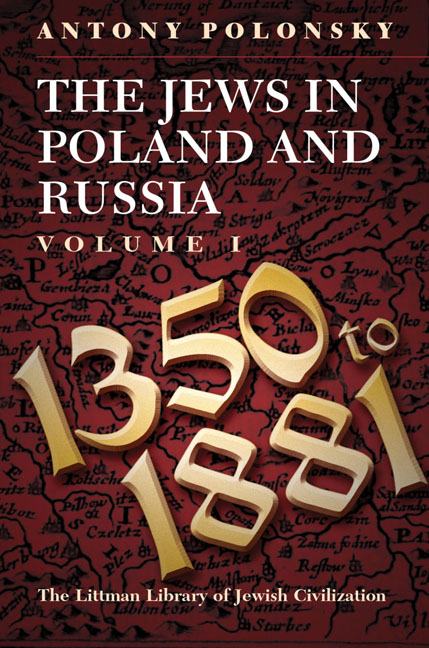Book contents
- Frontmatter
- Dedication
- Acknowledgements
- Contents
- List of Maps
- List of Tables
- Note on Transliteration
- Note on Place Names
- Maps
- General Introduction
- PART I JEWISH LIFE IN POLAND–LITHUANIA TO 1750
- PART II ATTEMPTS TO TRANSFORM AND INTEGRATE THE JEWS, AND THE JEWISH RESPONSE, 1750–1880
- Glossary
- Bibliography
- Index
7 - The Jews in the Prussian Partition of Poland, 1772–1870
- Frontmatter
- Dedication
- Acknowledgements
- Contents
- List of Maps
- List of Tables
- Note on Transliteration
- Note on Place Names
- Maps
- General Introduction
- PART I JEWISH LIFE IN POLAND–LITHUANIA TO 1750
- PART II ATTEMPTS TO TRANSFORM AND INTEGRATE THE JEWS, AND THE JEWISH RESPONSE, 1750–1880
- Glossary
- Bibliography
- Index
Summary
THE HISTORY OF THE JEWS in the Prussian partition does not bulk large in Jewish collective memory, yet it is important for a number of reasons. This was the first area in the lands of the former Polish–Lithuanian Commonwealth where Jews achieved civil emancipation. Almost all restrictions on Jewish activity were done away with in the run-up to the revolution of 1848, and the remainder were abolished in 1869. It is generally held that integration—the transformation of the Jews into citizens of the respective countries where they lived, as Englishmen, Frenchmen, or Poles of the Mosaic faith—did not succeed on the Polish lands. However, by the middle of the nineteenth century most Jews in Prussian Poland did regard themselves as Germans of the Mosaic faith.
A second reason for the importance of the Prussian partition in the history of Polish Jewry is that Berlin, the capital of Prussia, was the principal source of the Haskalah, the Jewish Enlightenment. It was primarily from Prussian Poland that the influence of the Haskalah spread to the rest of Poland (although one should not ignore the influence of the Seitenstettengasse synagogue in Vienna). Abraham Meir Goldschmidt (1812–89), the first preacher in the ‘reformed’ synagogue on Daniłowiczowska Street in Warsaw, came from Krotoszyn, in Prussian Poland. His successor, Marcus Mordecai Jastrow (1829–1903), came from Rogoźno and was educated in the Protestant (German) gymnasium in Poznań.
The success of the Haskalah has been attributed to the weakness of hasidism in this area. This has sometimes been explained as a result of the fact that the region was not affected by the Cossack rebellions of the mid-seventeenth and eighteenth centuries. Rabbinic authority may also have been better preserved there. Certainly what this meant was that, unlike the situation in the other areas of Poland–Lithuania, the hasidic alternative to rabbinic traditionalism, which was so effective in opposing the educational projects of the Haskalah elsewhere, was absent.
Jews from Prussian Poland played an important role in German Jewish history. The area became a sort of Alsace-Lorraine for German Jews, a reservoir of more traditional and, in some ways, more nationally conscious Jews.
- Type
- Chapter
- Information
- The Jews in Poland and RussiaVolume I: 1350 to 1881, pp. 223 - 247Publisher: Liverpool University PressPrint publication year: 2009

